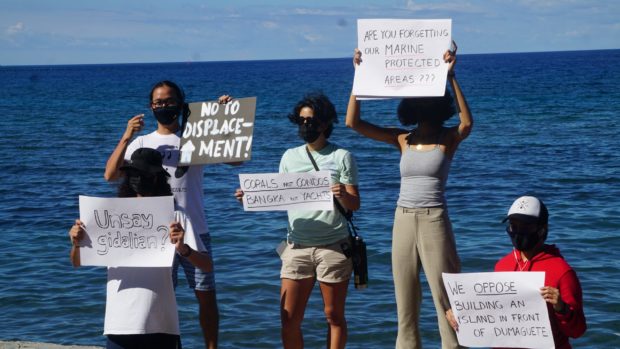Rethink reclamation, Dumaguete execs told

YOUTH VOICE Students and residents express their sentiments against a proposed reclamation project that will affect 174 hectares in Dumaguete City’s shoreline. —PHOTO COURTESY OF MATTHEW VINCENT TABILOG
DUMAGUETE CITY, Negros Oriental, Philippines — Local officials have moved the signing of an agreement with a private firm for the implementation of a proposed 174-hectare reclamation project here following strong opposition from different groups who raised its negative impact on the marine environment and the livelihood of small fishers.
Mayor Felipe Remollo was supposed to sign the joint venture agreement (JVA) with the developer, E.M. Cuerpo Inc., on July 12 but this did not push through. No explanation was given by city officials regarding the postponement.
Replying to a post on Facebook, Vice Mayor Karissa Tolentino Maxino said: “To dispel any misunderstanding and apprehensions, we [have] recommended to the executive department to amend the JVA.”
Councilor Michael Bandal said some council members were “contemplating on making amendments. We’re reevaluating … the JVA, per concerns [of the] public.”
On the day of the supposed signing, the Negros Oriental provincial board led by Vice Gov. Mark Macias approved a resolution asking the Dumaguete council to defer and reevaluate its authority and consent given to the mayor to enter into a JVA until a comprehensive and scientific study had been made by environmental experts.
Article continues after this advertisementProtests
“It is apparent that the consent and authority given by the city council of Dumaguete to the city mayor to enter into such agreement was hastily done and ostensibly decided on without the exercise of due diligence—acts that a legislative body should have applied in matters involving the environment and natural resources,” the resolution read.
Article continues after this advertisementSeveral residents and groups in Dumaguete and Negros Oriental staged protest rallies and expressed on social media their dismay at and objection to the city council’s “railroaded approval” of the reclamation project.
“People now feel betrayed for having been bypassed in this matter of great concern. It would have been reflective of effective representation had the voice of the people and their sentiments [were] heard before the city council gave their favorable consent to the city mayor to bind the city into the contract,” said the resolution approved by 11 board members. One board member abstained while another dissented. Environment Undersecretary Jonas Leones said the Department of Environment and Natural Resources (DENR) Central Visayas office had not yet received any application for “notice to proceed” to apply for an environmental compliance certificate, a requirement under the law before any project could begin.
“They are still in the project planning stage, as seemingly they don’t have funds for it and they’re looking for private entities to invest in their proposed project,” he told the Inquirer on Monday.
Consultation needed
According to the draft joint venture agreement between the Dumaguete government and private firm E.M. Cuerpo Inc., a copy of which was obtained by Inquirer, the firm will fund the entire reclamation project.
The local government, meanwhile, will waive all regulatory fees and local taxes, such as contractor’s tax and building permit fees, during the project construction, and assist in securing the necessary permits from other government agencies.
Under the draft agreement, E.M. Cuerpo is also expected to manage and operate the ancillary businesses in the reclaimed area, such as fish ports, ferry stations and a yacht club. While these businesses will be jointly owned, 75 percent of the revenue will go to the private firm and the remaining 25 percent to the city government.
Out of the total reclaimed area, 88.74 ha, inclusive of roads and open spaces, will be allocated to the city, while 85.26 ha will be for the private company.
Councilor Lani Ramon said the project proposal was submitted by the developer in November 2019 and was studied by a public-private partnership selection committee created by Remollo.
Councilors Agustin Miguel Perdices and Joe Ken Arbas pointed out the need for a public consultation before allowing the mayor to sign the JVA as this would already bind the city to follow its terms.
“Let’s give this time. We even consult specialists on a mere resolution. This is not a mere resolution because this will affect generations to come,” Perdices said.
Heo Elentorio of Zero Waste Negros Oriental said the project would destroy marine protected areas and affect fishing communities in the city’s shoreline.
“Mountain communities will also be affected if the project will source out from local mountain lands for the reclamation,” he said.
The national fishers’ group, Pamalakaya, said the DENR should take into consideration the sentiments of scientists, environmentalists and residents.
“Reclamation has long been proven to be catastrophic not only to [the] marine environment, but also to the livelihood of coastal communities,” said Fernando Hicap, the group’s national chair, in a statement.
“It should be a no-brainer for the DENR to reject this reclamation project,” he added.
—WITH REPORTS FROM RAFFY CABRISTANTE, KARLOWE BRIER AND JHESSET O. ENANO